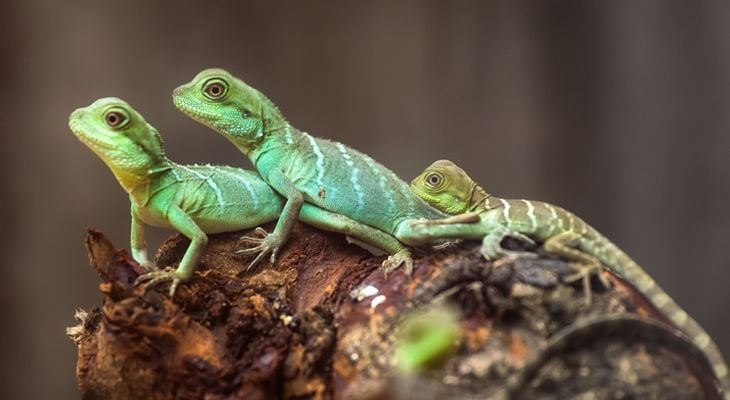Many diseases of people also occur in pets. A problem that is common in people, dogs, and cats is heart disease. While these disorders have some things in common, many ailments of the heart in pets are completely different than what occurs in people. Recent surveys have shown that 11% of all dogs have
Read more

People with limited living quarters may find that reptiles such as lizards or turtles fit perfectly into their lifestyles. Before deciding on a reptile, learn as much as possible about them and their needs. Poisonous snakes and certain reptiles should never be kept as pets. Ask your veterinarian about the suitability of a particular animal before you make your decision. There are many things to consider before committing to a reptile as a pet.
Finding out if a Pet is Legal Where You Live
Many areas have enacted laws pertaining to keeping reptiles. Some are general and some are quite specific; in many places any reptiles that are considered dangerous (venomous snakes, alligators, etc.) are illegal but some places are even more restrictive (for example, in some states all constricting snakes including ball pythons are illegal).
Salmonella Risks and Prevention
All reptile owners need to be informed about Salmonella infections. While the risks shouldn't keep most people from keeping reptiles since with the proper management the risks are minimal. Still, owners should be aware of the risks, and the US Centers for Disease Control recommends that certain risk groups should be careful about contact with reptiles and amphibians.
The Importance of Light and Heat
Many problems with keeping reptiles can be traced back to not providing the proper environmental conditions, particularly heat. Proper lighting is also important for many reptiles. The equipment to provide the proper heat and light to captive reptiles is often quite expensive, but is absolutely essential to keeping pet reptiles healthy. It is important to find out exactly what conditions your reptile needs and never cut corners when it comes to meeting those conditions!
Why Choose Captive Bred Reptiles
There are numerous reasons why you should pick a captive bred reptile if at all possible, as explained here.
How to Pick a Healthy Reptile
It is important to keep in mind that depending on where you get a reptile, it may be very stressed, dehydrated, and prone to illness. Here are some items to look for when buying your reptile to increase the chances of picking out a healthy pet reptile.
While there are many types of reptiles that could be good pets, here we cover a few you could consider.
-
Matters of the Heart
Category: Newsletter Library, Recognizing Illness
-
Lyme Disease & Your Pets
Category: Newsletter Library, Recognizing Illness
How to Prevent and Remove Ticks Lyme disease is a top concern for dog owners who enjoy walking with their dog in grassy and wooded areas. Transmitted by deer ticks, Lyme disease can result in fever, joint lameness, fatigue, and general discomfort for your pet. While treatment is available, Lyme disease
Read more -
Leptospirosis
Category: Newsletter Library, Recognizing Illness
Leptospirosis is a re-emerging disease. This bacterial disease most commonly causes liver and kidney problems in dogs, but can also cause lung, pancreas, and eye symptoms. It is a zoonotic disease, meaning it can be transferred from animals to people, in fact, it is the most common zoonotic disease in
Read more -
Is Your Pet In Pain?
Category: Newsletter Library, Recognizing Illness
There are signs to look for when your pet is experiencing pain. Together you and your veterinarian can identify and help your pet with pain that may be present. The issue of pain in animals is so critical that the American Animal Hospital Association (AAHA) teamed up with the American Association of
Read more -
Is My Dog Sick?
Category: Newsletter Library, Recognizing Illness
Identifying the signs of sickness in a dog can be challenging, even for the most vigilant pet owners. Since a sick dog is unable to verbally communicate what hurts, pet owners must pay close attention to identify the signs of illness. Subtle changes in behavior or appetite may be symptomatic of an underlying
Read more -
Helping Dogs with Low Vision or Blindness
Category: Newsletter Library, Recognizing Illness
As veterinary medicine advances, dogs are living longer and longer. With advancing age, more geriatric diseases are becoming prevalent. Problems with vision, such as cataracts, glaucoma, and keratitis, are common. Many of these problems occur so gradually that some people don't know they have a blind
Read more -
H1N1 or Swine Flu Virus
Category: Newsletter Library, Recognizing Illness
The H1N1 or swine flu epidemic has many people concerned. It certainly holds the potential for severe, worldwide disease in humans. Currently, most cases in the U.S. have not been as serious as in other countries. Flu viruses commonly mutate though, and even a small mutation could increase the pathogenicity
Read more -
Glaucoma in Pets: What You Need to Know
Category: Newsletter Library, Recognizing Illness
Glaucoma is typically a disease affecting middle- age to older pets. The symptoms can be very insidious in that they may not be noticeable at first, but eventually you may see a red eye or a dilated pupil, and ultimately, as the disease progresses, you can see that the eyeball is larger than normal. Glaucoma
Read more
Schedule an Appointment
Testimonials
Newsletter Signup
Sign up for more articles
Contact Us
We look forward to hearing from you
Office Hours
9:00 am - 6:30 pm
9:00 am - 6:30 pm
9:00 am - 6:30 pm
9:00 am - 6:30 pm
9:00 am - 6:30 pm
10:00 am - 6:00 pm
10:00 am - 6:00 pm
Our Location
99 Queen Street South
Tottenham, ON L0G1W0
info@pynehillsvet.com
